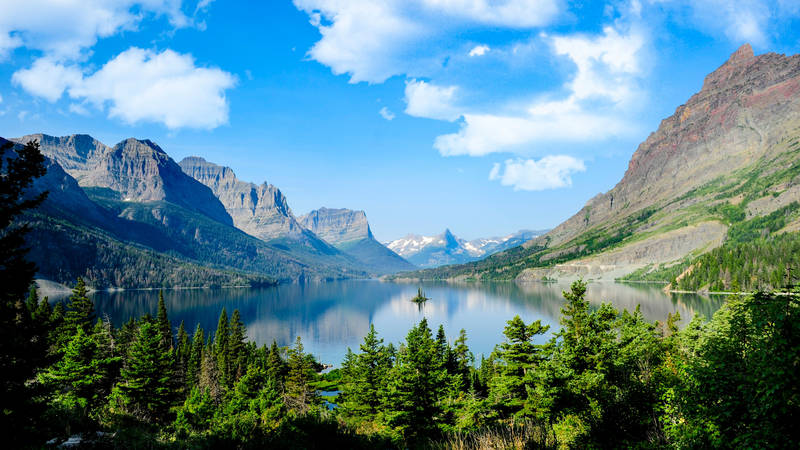If passed, this comprehensive bill would provide nearly $1 billion for NPS to hire more staff and adapt its natural, cultural and historic resources to the changing climate.
Washington, DC – After months of deliberations, the U.S. Senate has introduced major legislation to address the climate crisis and begin to transition the nation to clean energy. The Inflation Reduction Act of 2022 comes at a crucial time for our national parks, which have been hit hard by the effects of climate change for years like rising sea levels, increased fires, extreme droughts, receding glaciers and damage to wildlife habitats. If passed, this comprehensive bill would provide nearly $1 billion for the National Park Service (NPS) to hire more staff and adapt its natural, cultural and historic resources to the changing climate.
Climate change is the biggest threat to our national parks, and never has the issue been more on display than with the recent flooding in Yellowstone and fires burning in Yosemite. For years, NPCA and our members and supporters have spoken out demanding actions to ensure that our parks and communities are protected from climate change, and today, the Senate’s historic proposal demonstrates that we’ve been heard loud and clear.
Extreme weather events are happening across the country, and all of our more than 420 national parks have been experiencing the effects. Yellowstone, America’s oldest and one of our most beloved national parks, was evacuated and closed as historic rainfall combined with record snowmelt caused catastrophic flooding in the park and surrounding communities. While Yellowstone captured the nation’s attention, many other parks are also suffering. Glaciers are melting at a distressing rate at Olympic National Park, flooding is washing away Harriet Tubman’s former homesite, homes are collapsing into the ocean at Cape Hatteras and wildfires are burning hotter, faster and more frequently across the west, threatening Yosemite, Katmai, Bryce Canyon and Carlsbad Caverns. And communities are also being devastated by these effects like those surrounding Lake Powell and Lake Mead, which are at historically low levels due to droughts. The adjacent communities that depend on these reservoirs for drinking water and electricity are now facing unimaginable risks and uncertainty.
The Inflation Reduction Act of 2022 is a necessary step forward to meet the needs of Americans, who agree more than ever before on the need to combat this crisis. In fact, a national poll by NPCA found that a strong bipartisan majority of Americans see parks as part of the solution to address climate change. And most Americans (83%), regardless of political affiliation, would be likely to support their representative in Congress that supported a bill designed to reduce the impact of climate change on national parks. NPCA and our members and supporters have been demanding climate action for years, and Congress is listening.
Important provisions included in the Inflation Reduction Act of 2022:
- Creating jobs that focus on reducing greenhouse gas emissions driving fires, floods and storms and helping parks and communities adapt to the changing climate.
- Investing in clean buildings, electric vehicles and renewable energy.
- Necessary oil and gas reforms including increasing royalty rates and bonding requirements on public lands, as well as protections from methane pollution.
- Preparing the nation to handle the heavier rains, hotter temperatures, stronger and more frequent storms, and higher sea levels associated with climate change.
Statement from Theresa Pierno, President and CEO for the National Parks Conservation Association (NPCA):
“The recent flooding at Yellowstone and fires at Yosemite are prime examples of the devastation that comes with the climate crisis, and the urgent need for climate legislation for our national parks and communities. This historic investment will ensure our parks have more resources and staff necessary to safeguard our parks from increasingly severe floods, fires, drought and other extreme weather. By addressing these staffing and infrastructure needs, while also boosting renewable energy and reducing carbon emissions, this bill will help protect our parks for future generations.
“Climate change is happening right before our eyes and the effects are only becoming more frequent and severe. We’ve witnessed a historic drought shrivel Lake Mead to just 30% of its capacity. Last month, we watched unprecedented floods destroy roads and wash away houses in Yellowstone and inundate buildings and campsites in Voyageurs. And most recently, we saw another deadly wildfire threaten Yosemite and its ancient sequoia trees. This is an alarming trend, and our national parks are at the forefront.
“And it’s not just our national parks. Adjacent communities, especially our most vulnerable and overburdened populations, are being devastated by the effects of climate change, taking months and sometimes years to recover and rebuild. This legislation will help parks and surrounding communities become more resilient and better protected from the rapidly accelerating effects of climate change.
“We are grateful to leaders in the Senate for acting on climate. With climate change threatening everything we know and love about our national parks, we cannot wait. Congress must pass funding swiftly so that our parks can start to rebuild their roads, bridges and buildings, and do so in ways that prepare and protect them for the next hundred years. The future of our national parks and communities depends on Congress acting now, and fast.”
###
About the National Parks Conservation Association: Since 1919, the nonpartisan National Parks Conservation Association has been the leading voice in safeguarding our national parks. NPCA and its more than 1.6 million members and supporters work together to protect and preserve our nation’s most iconic and inspirational places for future generations. For more information, visit www.npca.org.


